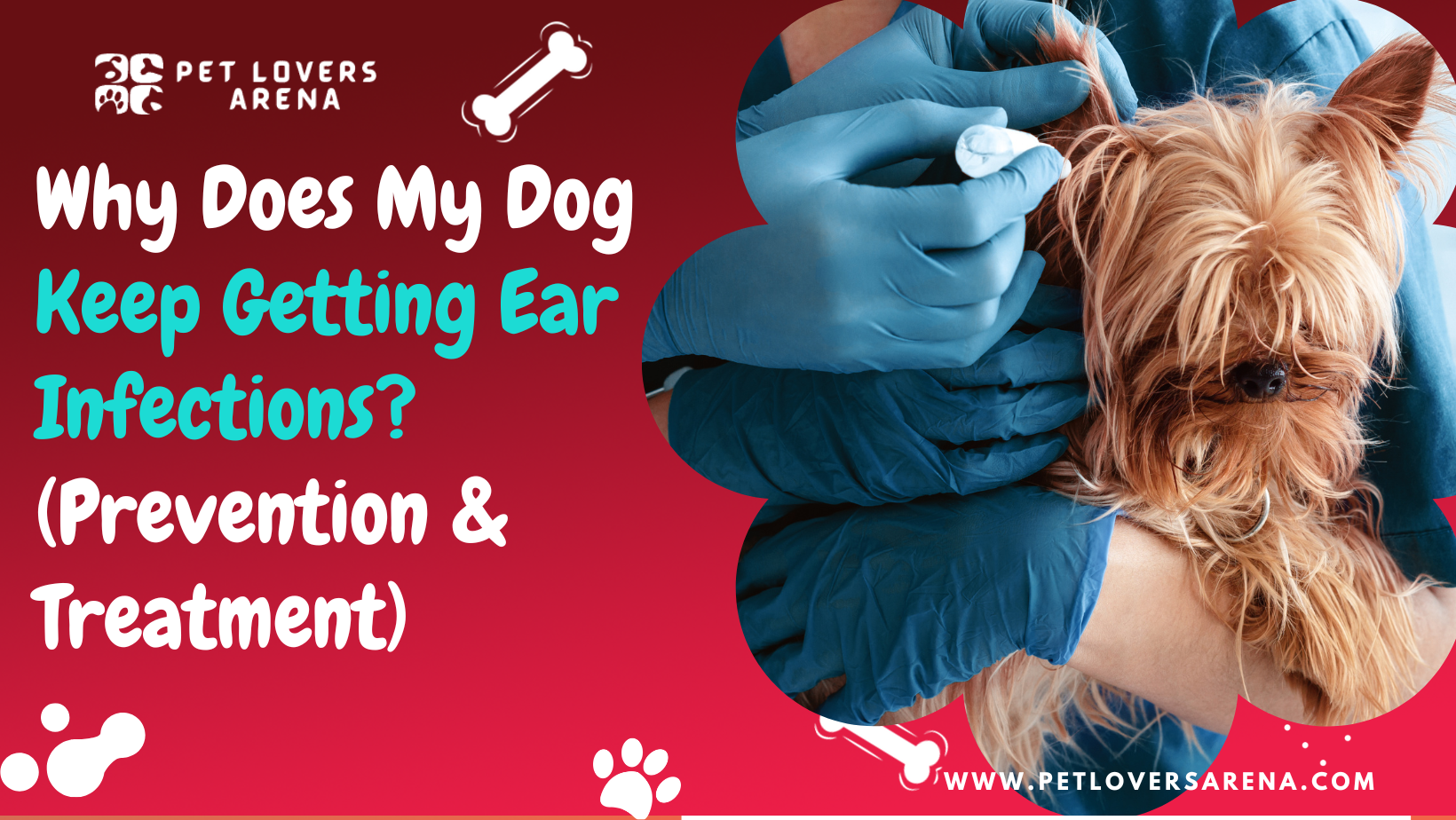You can easily notice the different shapes and sizes of dogs’ ears, but they greatly vary in anatomy from those of humans’ ears. Dogs have a long ear panel with both horizontal and vertical components. Both these kinds of ear panels create an L-shape or J-shape that makes the debris attached to this area easily. This debris is mainly responsible for numerous ear infections in your dog.
Ear infections in dogs are very common. The disease is so common that it is the main reason that it has been listed as one of the top five medical conditions that dogs have.
Here are some signs you can see in your dog if you think that he has an ear infection. Besides this, you will also learn about the prevention and treatment measures for ear infections. Read the article to learn more about this ear infection condition in dogs, its treatment, and prevention.
Bonus Read: My Dog Ate Tums: What Will Happen Now?
What Are The Three Types of Ear Infections in Dogs? Explaind
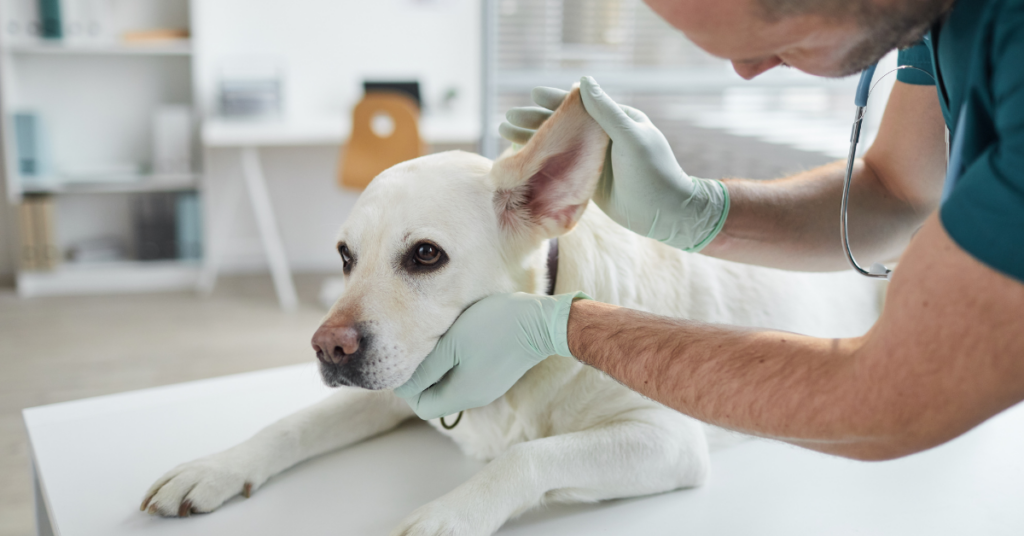
There is an ear canal inside your dog’s head, followed by the eardrums, middle ear, and inner ear. The inflammation of the ears in dogs is known as otitis and is based on its location in the ear; it is further divided into three types.
- Otitis externa is the condition of inflammation of the ear canal.
- Otitis media is the condition of inflammation of the middle ear.
- Otitis interna is further the condition of inflammation of the inner ear.
Of these three ear infections in your dogs, Otitis externa is the most common dog ear infection. And this part of the dog’s ear is most prone to the attachment of dust particles.
Dogs can have ear infections in either one ear or both ears. These ear infections in dogs can be recurrent, acute, or chronic.
What Are The Signs and Symptoms of Ear Infections in Your Dog?
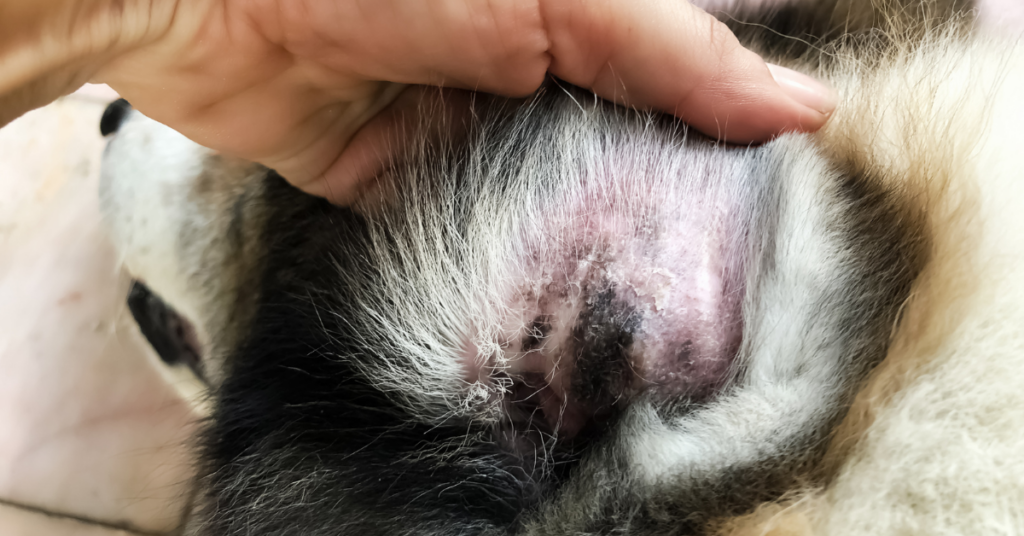
Normally, a healthy dog has dry ears, but it is normal to see small microscopic bacteria sometimes in the outer ear canal of your dog. But when a lot of debris gets attached to the external ear canal of your dog, you may notice ear infections in your dog.
Ear infections in your dog occur when bacteria in the dog’s external ear grows due to debris buildup.
The common signs and symptoms of ear infections you can notice in your dog include the following; you can have a look:
- Pain
- Head tilt
- Excessive ear discharge
- Redness
- Itching
- Odor
- Shaking of the head
Occasionally, you may notice your dog having hearing and balance problems due to ear infections. Rarely, ear infections can affect the appetite of your dog. These signs of appetite loss are common if the infections occur in Otitis media or the interna.
Bonus Read: My Dog Just Ate A Mouse: What Should I Do Now?
What are The Basic and Main Causes of Ear Infections in Dogs?
There can be many reasons why your dog has ear infections, and these reasons vary widely. Often, many underlying diseases cause barriers in your dog’s ears, causing them to stop working properly.
Once the environment of your dog’s ear gets moist, there are more chances for bacteria to grow and cause infections in your dog’s ears.
Here are some common causes that are mostly responsible for ear infections in your dog:
- Environment allergies
- Foreign bodies
- Food allergies
- Excessive moisture from swimming or bathing.
- Ear mites
- Auto-immune diseases like lupus, vasculitis, or pemphigus.
- Polyps
- Trauma to the ear
- Certain cancers
- Endocrine issues like hypothyroidism.
- Excess Wax buildup in dog’s ear.
- Excessive cleaning of the dog’s ears causes trouble.
- Any injury to the dog’s ear canals makes it more prone to ear infections.
What is The Proper Diagnosis Needed For a Dog’s Ear Infections?
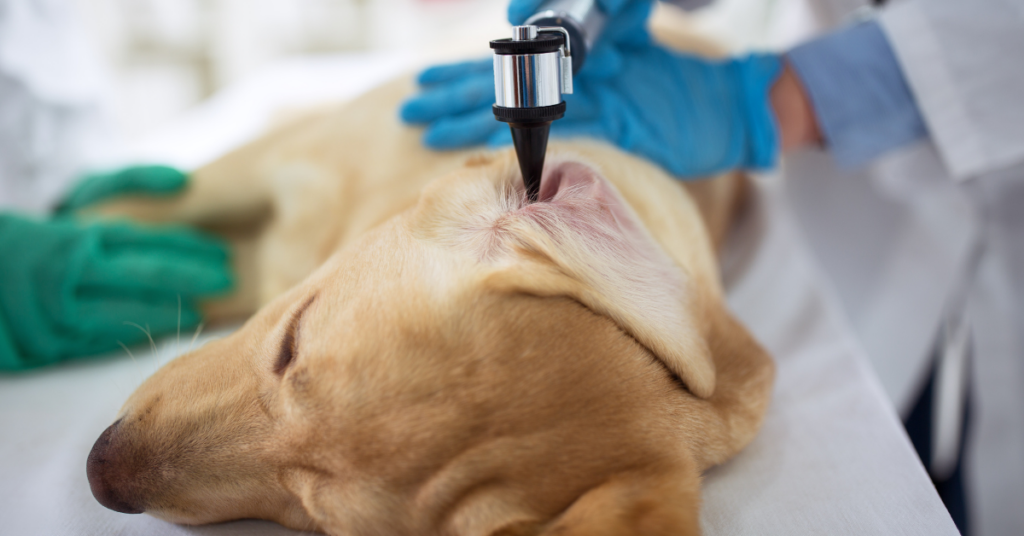
Your first step should be to contact the veterinarian if you notice your dog showing ear infections. Contacting the veterinarian is not only important for curing your dog, but it is also important to prevent the infection from spreading into the internal and middle ear of your dog. The special advice is not to treat your dog’s ear infections at home alone without any guidance.
You should be prepared for certain things before visiting the veterinarian, like gathering complete information about your dog’s condition. This information is especially important if your dog has an ear infection for the first time or you are visiting a new veterinarian for your dog. Here are the things that you need to inform your veterinarian about ear infections in dogs:
- What is the diet of your dog?
- Is there any pain your dog is experiencing, and if yes, for how long?
- What is the duration of the symptoms and pain your dog is facing, and since when?
- Are there any allergies or underlying medical conditions that your dog has?
- How often is it for you to clean your dog’s ears?
- What recent activities has your dog engaged in, such as swimming, bathing, and so on?
- If there is any history, your dog has had ear infections.
- If the hairs in your dog’s ears have been plucked recently or if you cleaned your dog’s ears,
After taking the complete information of your dog’s history, your dog’s veterinarian will perform a proper physical exam, i.e., a complete examination of your dog’s ear.
In severe cases, the veterinarian may sedate your dog and then perform a checkup on both ears.
The exam that the veterinarian will perform on your dog may include:
- X-rays or biopsies of your dog’s ears in severe cases
- To assess the pain level, gently palpate your dog’s ears.
- Taking culture samples from the ears of your dog
- An otoscope is a necessary equipment for proper examination of the eardrum and ear canal.
- Visual assessments for looking for signs like redness, swelling, etc. in your dog’s ears
- Microscopic examination of the samples taken from the dog’s ears to check infection should be properly done.
Bonus Read: Dog Gorged On Dry Food: Prevention, Aftermath & Treatment!
Are Ear Infections In Dogs Contagious?
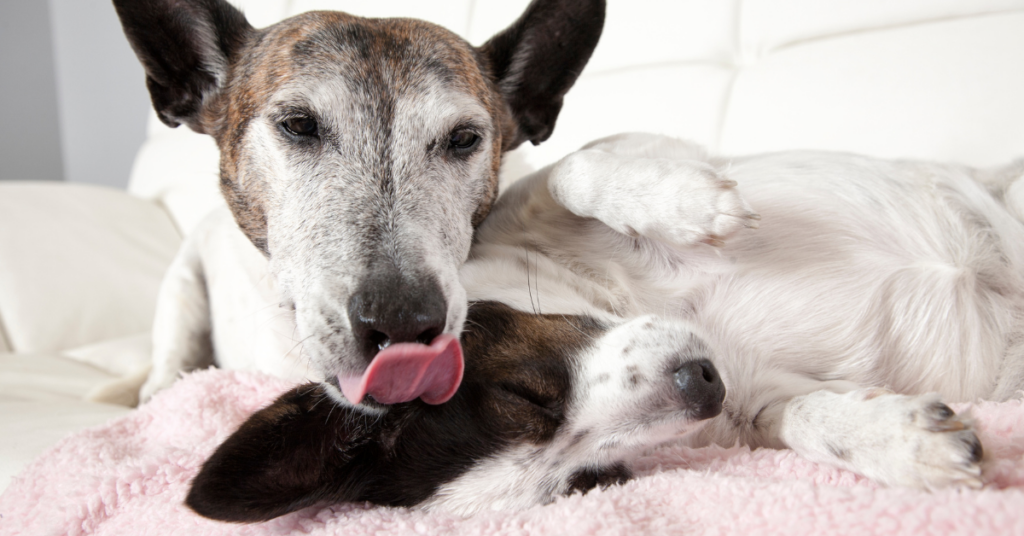
Yes, but this happens rarely.
It depends upon different factors that you need to see before deciding whether the ear infections in dogs are contagious or not. But in most cases, if you will notice, ear infections in dogs are not contagious; they happen due to an injury or excess wax buildup. Also, the mites that cause these ear infections are contagious.
Whether kittens or puppies, in the case of ear mites, all pets should be treated equally. In puppies and kittens, ear mites are very common, and you may not notice these mites when your puppy is small or when you adopt a new one.
However, shortly after bringing such a pet into your home, you may notice that the newly purchased pet and other pets begin itching and scratching themselves.
Methicillin-resistant Staphylococcus aureus (MRSA) and other contagious diseases can be easily cultured from an infected ear of a pet, so be careful.
It is highly recommendable that when you touch a dog or other pet that has an ear infection, you should wash your hands.
Washing your hands afterward will reduce the risk of spreading these diseases. Also, after applying an eardrop to your dog’s infected ear or examining your dog, you should wash your hands properly. It would be best if you did not let any other pet in your home lick the dog’s infected ear, as this will reduce the spread of ear infections.
Is it Possible For Your Dog’s Ear Infection To Go Away on Its Own?
No, they can’t go on their own; it needs treatment. When your dog has an ear infection, you should usually take the dog to the vet.
No matter what type of ear infection it is, a visit to the veterinarian is necessary. Moreover, without the vet’s prescription, if you give medicine to a dog whose eardrums or ear canal are damaged, it may cause trouble and worsen the ear infection.
Can We Treat Ear Infections In Dogs at Home?
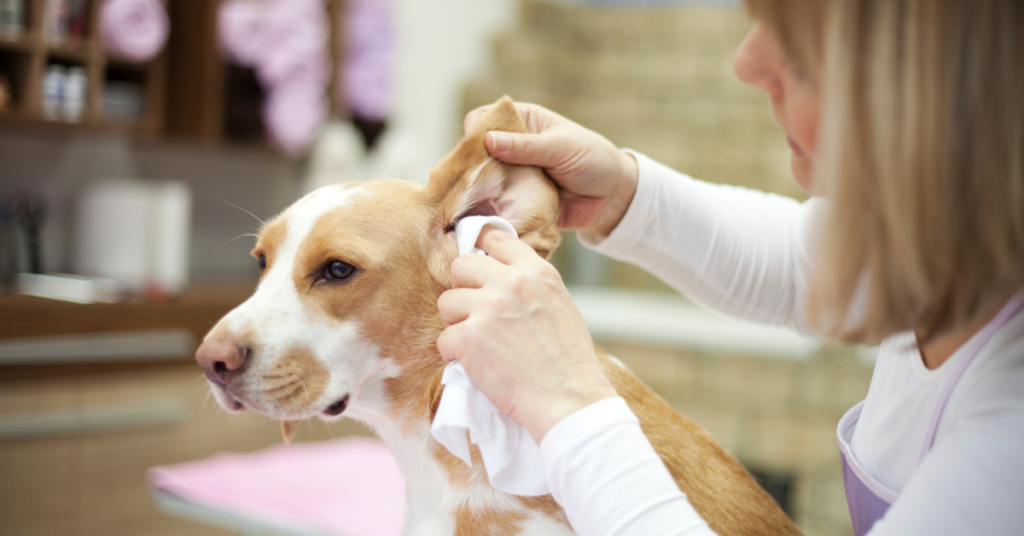
No, you can’t. Ear infections in your dogs need proper treatment. Unfortunately, that means you have to consult a veterinarian only, and it is not possible at home. If you try to give treatment to your dog and clean its ear canal at home, this can cause trouble for your dog.
The veterinarian will thoroughly check your dog’s ears and prescribe medications and treatment. After the proper medication, the veterinarian will suggest if any home treatment is necessary for your dog. This treatment or suggestion will only be provided after a proper checkup of your dog’s ear.
If there is a small amount of debris in your dog’s ears, you can give the dog home treatment; if it is not, you need to consider the veterinarian for the same and give your dog a proper cleansing treatment to clear the debris.
What is The Treatment of Ear Infections In Dogs?
Before anything, the first step in treating ear infections in your dog is to take the dog to the veterinarian. The veterinarian will perform some tests on your dog to decide the treatment.
These tests are very important for appropriately treating your dog’s ears. Here are some of the tests that the vet can perform on your dog for a proper diagnosis:
- Skull x-rays, a CT scan, or an MRI are recommended as this test is important to check the extent to which ear infections have spread in your dog’s ears.
- To check for endocrine disease as an underlying condition: there can be some necessary blood tests that the vet will perform on your dog.
- In cytology, special stains on the swab of debris are used to color the microscopic bacterial cells or fungus that will help identify the infection’s real cause.
- Culture/sensitivity testing in which it uses a special medium or broth to identify a certain bacteria that is causing the problem.
The veterinarian takes all the details of your dog’s ears; the proper treatment for your dog’s ear infection begins.
To clean the dog’s ears: there can be certain surgeries the dog’s vet performs on your dog if the condition is chronic. Here are some basic ways to treat the problem.
Bonus Read: Is It Normal For A Puppy To Have A Big Belly?
Topical
A cleanser or a combination of ear drops and ointment can be used for ear infections in your dog. These medications or cleansers need to go deep inside your dog’s ear canal. Sometimes oti-packs can be used to take care of ear infections in your dog.
Sometimes instead of applying drops and ointment to your dog’s ear, a medication based on lanolin is slowly released into the dog’s ear.
Oral medication
Depending upon the sensitivity of your dog’s ears and the extent of the infection, the doctor can prescribe some drugs.
These drugs can be antifungal or
It depends upon your dog’s condition so as to cure your dog fully.
Surgical
If the dog’s ears have had ear infections for a long time or chronic ear disease will particularly not respond to any medication or ointments.
To treat such dogs, the veterinarian needs to perform certain surgeries. In this case, the dog’s ear canal gets opened, and, after that, the diseased tissues get removed from your dog’s ear canal.
When you visit the vet, the vet will examine the dog’s ear infections and then clean the ear of your dog. After that, the vet may give you some medications and topicals for your dog to use at home. Only in severe cases, mostly anti-inflammatory and antifungal medications are prescribed by the vet himself.
It will take approximately 1 to 2 weeks for your dog to heal from ear infections, but it can take far more time in severe or chronic cases. If the condition can’t be cured by medication, the vet will advise your dog to undergo surgery where the diseased or infected tissue will be removed.
It is important to complete the course of medications the veterinarian prescribes for your dog and not leave it in mid as it may cause trouble. The vet will give your dog a particular medication and advice for regular checkups. Don’t let the regular checkup of your dog go by, as it may not only cause trouble for your dog but can lead to a regrowth of infections.
Even when you notice that the infection is getting better, you still need to complete the course of medication for your dog, or the situation may lead to your dog’s bad health, and there will be a high chance for the disease to recur again.
What Measures Should Be Taken If The Dog Has a Chronic Ear Infection?
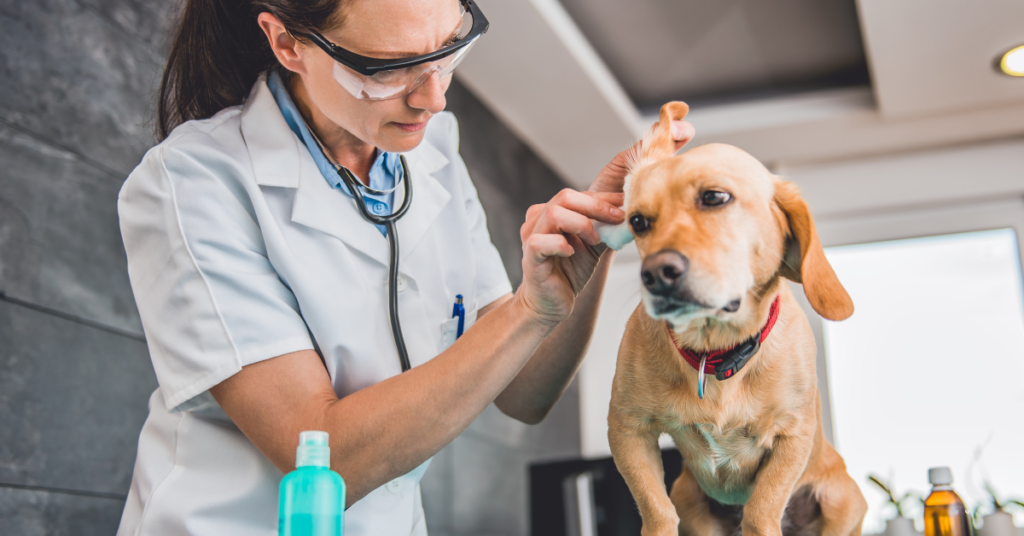
If your dog acquires a chronic ear infection, it can be stressful and troublesome for the pet owners, the pet, and even the veterinarian.
Certain breeds are more prone to these recurring ear infections than all the other breeds. There can be many reasons for these breeds to have recurring ear infections. It may be due to genetics, ear shape, size, configuration, etc. Over time, there can be the formation of proliferative tissues that cause more trouble for your dog.
- Shar-Peis possess small ear canals that can easily hide debris.
- Labrador Retrievers and golden retrievers are more prone to allergies, causing the risk of serious ear infections in such dogs.
- Cocker Spaniels get ear infections from having long and floppy ears and a greater number of ceruminous glands.
- Schnauzers mainly have excess hair in the deep ear canal.
Chronic ear infections need perfect assistance from the veterinarian, and it may take more than 6 to 8 weeks for these diseases to cure. Therefore, it would be best if you always described all the symptoms you notice in your dog to the vet, as it is important for your dog’s vet to design a medication for treating the dog and find the root cause.
After treatment, the dog must get the proper medications until the disease gets completely normal. After treatment, a regular checkup is important to check if the underlying condition is properly cured or not, as if it is not cured properly, it may cause trouble for your dog.
What Are The Different Ways to Prevent Ear Infections in Dogs?
Regular grooming, cleaning your dog’s ears, and maintaining a proper routine checkup is extremely important if you want to keep your dog healthy.
Regular cleaning of the dog’s ears is necessary, especially when you have your dog swimming regularly.
Cleaning your dog’s ears can be perfectly done by using a proper cleansing kit or special cleaning products for the dog’s ears. These ear products are specially designed to maintain the pH balance of your dog’s ears and cure any problem by cleaning bacteria, and these products contain drying agents.
Key points for ear cleaning in dog
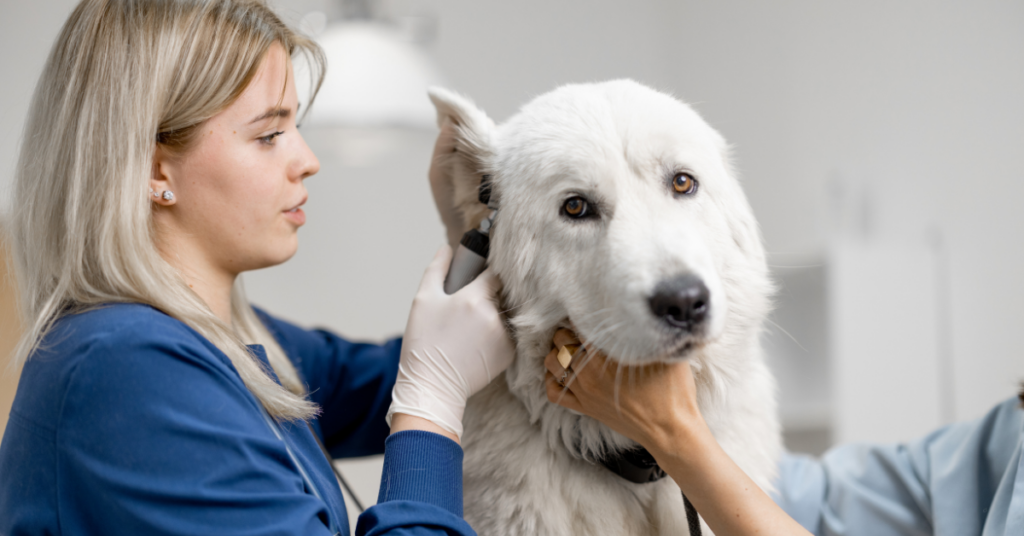
- Avoid using hydrogen peroxide in your dog’s ears as it also kills healthy cells.
- To clean the ear flaps and services, you can use cotton balls.
- Don’t stick damp cotton balls in your dog’s ears, as they can damage your dog’s eardrums.
Techniques for ear cleaning in dogs
- Always apply the ear cleanser as directed by the veterinarian.
- After applying the cleanser, the important step comes to close the earflap and massage the base of your dog’s ears.
- With a wet wipe or cotton pad, gently clean the ear.
- Apply the medications as suggested by the veterinarian.
Besides this, here are some measures to prevent ear infections in your dog that you can follow:
Rule out the underlying cause
Very often, an ear infection means that there is some underlying cause that is causing health problems in your dog. Only after treating this underlying health problem can you prevent ear infections in your dog.
Sometimes these underlying causes can be allergies, tumors, hormonal imbalance, etc. But, most often, skin allergies are responsible for ear infections in dogs. These skin allergies can cause inflammation, and the ear canal also breeds yeast and small bacteria that can further worsen the situation.
Keep your dog’s ears dry
Many yeast and bacterias live in warm places, and dogs’ ears are a perfect place for these bacteria to stay and grow.
The best prevention measure for dogs that are more prone to these bacterial ear infections is to clean their ears once every 5 to 10 days. After exposure to water, immediately clean your dog’s ears.
Before your dog takes a bath or goes swimming, add a cotton ball to your ear and clean the inside flap with a towel after the dog takes a bath.
The main reason for the ear infection is moisture, so whenever the dog comes home after bathing or swimming, make sure to dry your dog’s ears properly. Also, dogs are prone to chronic diseases, so try to find the underlying reason for these recurring chronic diseases. It can be allergies or something else.
Keep the ears of your dog clean
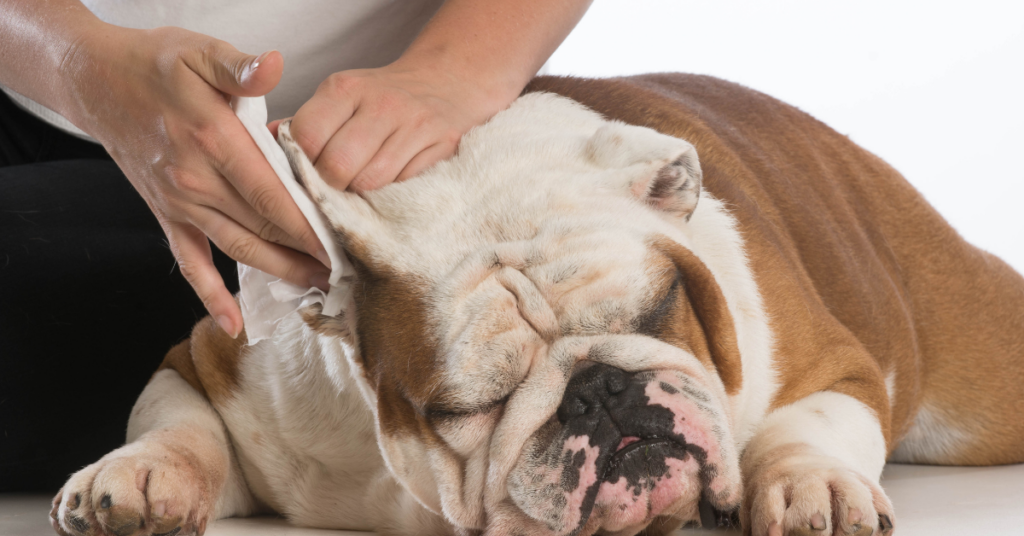
You can also clean your dog’s ears at home, but you must be very careful during the whole process of cleaning. You can use the vet-suggested solutions to clean the ears of your dog. Soak the cotton ball with the solution and then add the solution into the dog’s ear canal, being very careful.
After this, gently massage your dog’s ear and remove any debris with the help of a dry cotton ball, but you have to be careful while doing so.
Don’t insert the cotton inside the ear canal as it may push the wax deeper into your dog’s ear canals, causing trouble for your dog.
Consider giving supplements to your dog
There is no alternative to a good nutrition-filled diet, but still, you can give your dog some supplements to prevent ear infections in dogs.
Before you give your dog any supplement, consider going to the vet and checking the supplements again. If the root cause of ear infections in your dog is allergies, then you can give omega-3 supplements to your dog.
A malfunctioning immune system can cause further trouble by the deterioration of your dog’s health and can make your dog more prone to infections. Giving a probiotic supplement can help you to make your dog’s immune system strong.
Reconsider before plucking your dog’s hairs
Plucking dog hairs can be beneficial, but it is not always beneficial. For example, if the dog has healthy ears and has no ear infections, then the advice is not to touch the dog’s hair. But if the dog has a very hairy ear canal, then plucking the hair frequently after a short time can reduce the risk of your dog getting an ear infection.
The best advice is to consider a groomer for hair plucking in the case of dogs, as if the pet owners perform this procedure at home, it will be very risky.
Also, if you notice any change in your dog’s behavior, the main advice is to contact the vet if any such situation occurs.
Your dog’s vet will prescribe certain medications to help your dog cure ear infections soon and without much trouble.
Conclusion
If your dog has recently had an ear infection, it can be troublesome for you and your dog. It often becomes difficult to decide what to do to help your dog. This article mainly provides information on the reasons for this ear infection in your dog.
If there is rare debris in your dog’s ears, you can clean your dog’s ears at home by following certain steps only. But don’t try to be more impulsive and treat your dog by yourself even if you think you can’t clean your dog’s ears. Instead, the best advice is to take the dog to the vet, as this can help your dog in the best way possible.
Meet Madison Phillips, your compassionate guide to pet well-being. With experience from VCA Animal Hospitals and Laxton Vet Clinics Bellaire Inc. Madison honed her skills and embraced the balance of medical expertise and compassion, through her articles, she simplifies pet care, whether you’re a newbie or an experienced pet parent.

